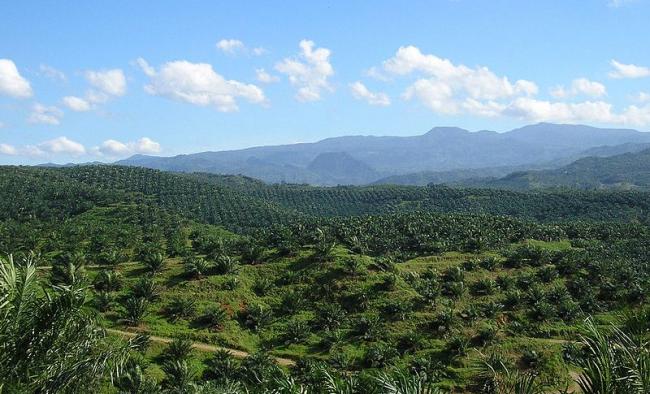Articles Menu

JANUARY 4, 2021
While other kids attend school, tens of thousands of children are toiling away in Indonesian and Malaysian palm oil plantations, vulnerable to trafficking and routinely exposed to pesticides and other workplace dangers. And their only hope for a better life lies in public pressure against Big Palm Oil.
Found in a “dizzying array of products”—from ice cream and bubble gum to face soap and Girl Guide cookies—palm oil is ubiquitous in the world’s cupboards. And the plantations of Indonesia and Malaysia produce 85% of the global supply, reports the Associated Press.
Much of that production is on the backs of child labour, with national and local governments turning a blind eye while multinationals drag their feet in response to calls for change, the news agency adds.
While hard numbers on just how many children currently work in Indonesia’s palm oil plantations are difficult to come by, “the UN’s International Labour Organization has estimated that 1.5 million children between the ages of 10 and 17 labour in its agricultural sector,” with the palm industry constituting a major share.
According to a 2018 government study, more than 33,000 children work in the palm plantations of Malaysia, nearly 50% of them between five and 11 years old.
That so many children work to produce the world’s palm oil “has long been a dark stain” on the US$65 billion industry, writes AP. “Though often denied or minimized as kids simply helping their families on weekends or after school, it has been identified as a problem by rights groups, the United Nations, and the U.S. government.”
Often pulled from school by parents desperate to make insanely high quotas, the working children are regularly exposed to toxic fertilizers and pesticides, heat stress, and other perils, including scorpions and skin-cutting palm leaves.
The AP also reports multiple accounts of abuse—all corroborated by accumulated dossiers of police reports and legal briefs, as well as interviews with “more than 100 activists, teachers, union leaders, government officials, researchers, lawyers, and clergy, including some who helped victims of trafficking or sexual assault.”
Particularly harrowing, reports the AP, are the circumstances of undocumented migrant children, whose desperately poor parents find subsistence employment in harvesting the palm fruit. “Without birth certificates and with no path to citizenship, they are essentially stateless—denied access to even the most basic rights, and at high risk of exploitation.” These children can receive neither public education nor public health care, and if they are caught up in a police raid, they may be sent away to detention camps, alone.
In Borneo, male harvesters are officially forbidden to bring their families into the plantations, but their “children often follow behind, sometimes traveling alone on illicit smugglers’ routes known as jalan tikus, or rat roads.” Official estimates are that there are “80,000 children of illegal migrants, mostly from Indonesia and the Philippines,” in the state of Sabah alone, while rights groups claim the true number is closer to 160,000.
Yet Indonesia and Malaysia are doing very little to redress their child labour problem, with governments “bristling” at any critique of an industry that plays a critical role in sustaining their economies. That leaves the multinationals that produce, purchase, and invest in Southeast Asian palm oil. And there, increasing consumer pressure is starting to make change.
“Many producers, Western buyers, and banks belong to the 4,000-member Roundtable on Sustainable Palm Oil (RSPO), a global not-for-profit organization that provides a green stamp of approval to those committed to supplying, sourcing, financing, or using palm oil that’s been certified as ethically sourced,” writes AP.
Charges of greenwashing abound, however, thanks in part to murky supply chains, and to a lack of clear labelling for palm oil—which often appears as vegetable oil, palmate, stearate, sodium laureth/lauryl sulphate, ethyl palmitate, palmityl alcohol, or other obscuring terms.
And while the RSPO has committed to addressing labour abuse allegations, “of the nearly 100 complaints listed on its case tracker for the two Southeast Asian countries in the last decade, only a handful have mentioned children,” AP adds.
Complicating matters is the fact that “monitoring the millions of workers hidden beneath palms covering an area equal to roughly the size of New Zealand” is “next to impossible.” And hide is what many do, notes AP, citing reports that women and children “are ordered to hide or stay home when sustainability auditors visit.”
While RSPO promises “sustainable” palm oil, “it doesn’t mean that that palm oil is free of child labour or other abuses,” said Robin Averbeck of the Rainforest Action Network. “It has simply become a tool for greenwashing.”
Contacted by AP, Nestlē declared that it aims “to prevent and address the issue of child labour wherever it occurs in our supply chain,” while brand titan Unilever said it forbids suppliers, under any circumstances, to “employ individuals under the age of 15 or under the local legal minimum age for work or mandatory schooling.”
Offering no response was Mondelez, which owns Oreo cookies, or PepsiCo, maker of Cap’n Crunch.
Also offering little answer was Canada’s Weston Foods, which owns Virginia-based ABC Bakers, one of the two companies that make Girl Guide Cookies. Because Weston declined to “provide any information about its palm oil suppliers, citing proprietary reasons,” AP “could not determine if its supply chain was tainted.”
One thing the palm oil companies could do, and easily, is to provide the funds and infrastructure to help the children of plantation workers go to school, said Glorene Das, executive director of Tenaganita, a Malaysian non-profit focused on migrant issues.
But that would mean addressing excessive work loads on the plantations which, again, are the primary driver behind parents themselves removing their children from school.
“Why aren’t companies playing a role in setting up schools in collaboration with the government?” Das asked. “Why are they encouraging the children to work instead?”
[ Top photo: Achmad Rabin Taim/Wikimedia Commons]